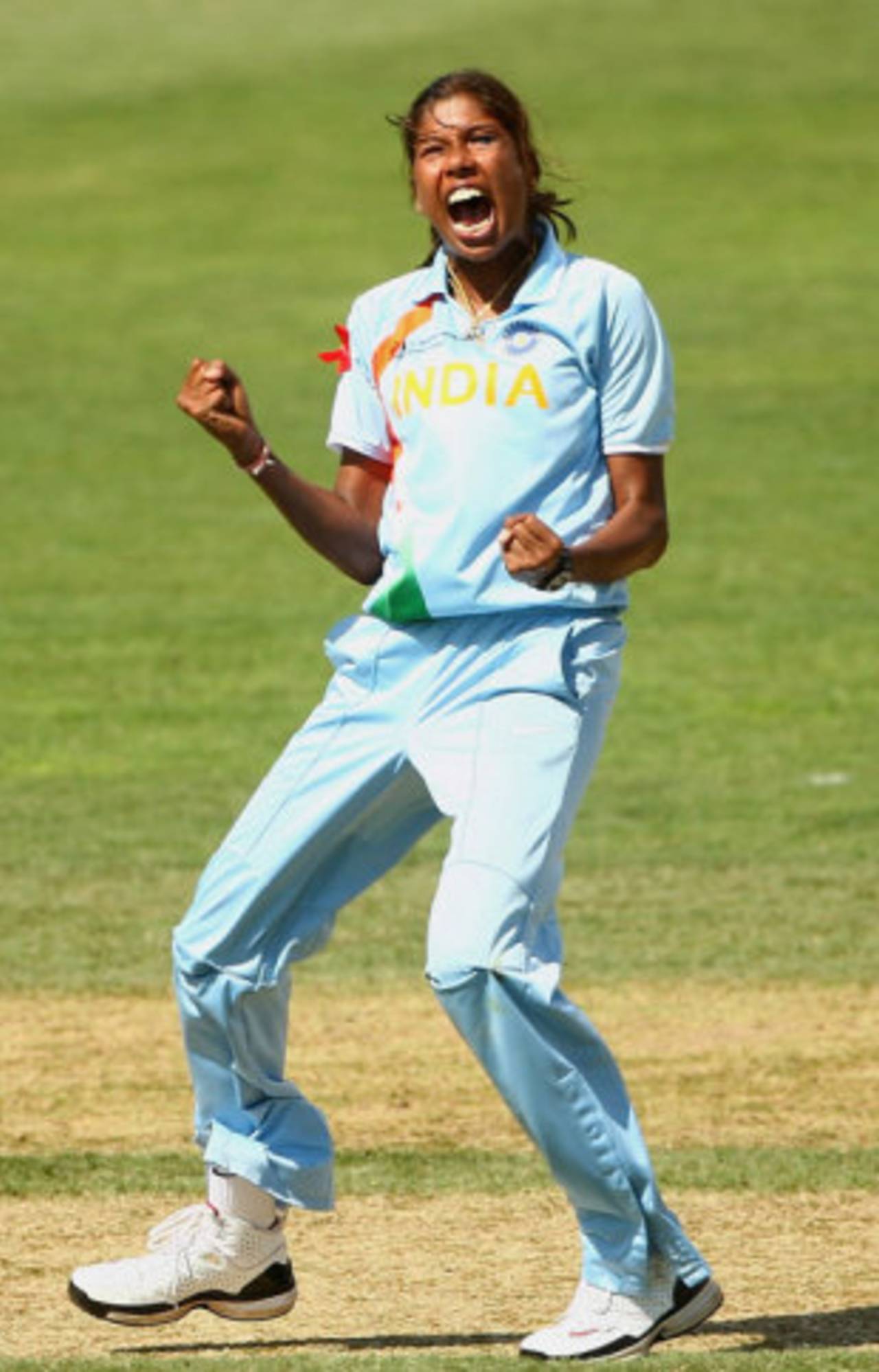When
Jhulan Goswami was a teenager, she had to wake up at 4.30 am to catch the train that would take her to practice - about 80 kilometres away in Kolkata - by 7.30 am. If she was late, her coach would not let her practice; 7.30 meant 7.30. There were no exceptions. It is that combination of discipline and desire that has propelled her to the top of the ICC's one-day bowling rankings, led to her being named India's captain and, on Wednesday, to becoming just the second India woman cricketer to be
awarded the Padma Shri after Diana Edulji, the first India Women's captain.
"This is a very special moment for me," Goswami told ESPNcricinfo. The award was a surprise. Goswami had not known she had been nominated and gave the credit to her family, coach and team-mates for their support and encouragement.
As significant as the Padma Shri award is though, it is only the latest addition to the list of honours for the 28-year-old. In 2010, she received the Arjuna Award, the highest civilian honour for sportspersons in India. She was also named the ICC Women's Player of the Year in 2007 and picked up the MA Chidambaram trophy from the BCCI for Best Woman Cricketer in 2011. These awards serve not only to motivate her, but also as reminders that she made the right choice all those years ago to chase her dream of playing cricket professionally.
"I don't know what I would do without cricket," she said. "If they had stopped me [from playing], I don't know what I would have done. Cricket has meant a lot to me. I am really, really passionate about the game."
Her father and cousins were avid follows of cricket and she would often join them in front of the television. She graduated to playing galli cricket with a tennis ball and soon found herself falling in love with the game. Her decision to commit her life to the sport came after watching the 1997 Women's World Cup final between Australia and New Zealand at Eden Gardens. Her parents were initially opposed to the idea. It wasn't just that Goswami wanted to play a sport, but that she was a woman who wanted to play a sport. "Indian culture is like that. For girls, they think, singing or dancing or drawing. Some other kind of activity, other than sport."
But with the help of her coach, Swapan Sadhu, who would visit her parents often to reassure them that their daughter had the talent and the determination to succeed, they came around and encouraged her to fulfil her dream. Today, this small town girl from Chakdaha in West Bengal is the third on the all-time list of wicket-takers, with 135 wickets in 114 ODIs, and is widely considered one of the fastest bowlers in women's cricket.
"When I came for a training session with Mr Swapan Sadhu, he gave me the ball and asked me if I bowl. I said, 'yes, I bowl'. After he saw my bowling action, he said you concentrate on your bowling and don't think about other things, like batting."
Goswami has been part of India's biggest successes on the field. She helped her side to a historic first-ever Test series victory over England in 2006, picking up match figures of 10 for 78 in the second Test at Taunton to script India's victory. She also led the country to two wins over Australia in the 2009 World Cup, the second of which enabled India to finish third and relegate Australia, the hosts, to fourth.
The captaincy, however, was not something Goswami ever considered would come her way ("Never, never, never," she said). Her goals were more modest - to make the India squad and possibly play for two or three years. If she managed that, then maybe a few years more. "When you start your career, you don't think about captaincy and all that stuff. You just want to be part of the team and enjoy the moment. At the end of the day, representing India is a big honour."
Those ambitions now seem quaint when measured against all she has accomplished since making her debut as a fresh-faced 18-year-old in 2002. She took over as captain from Mithali Raj in 2008, and has enjoyed her time leading the team, despite the pressures and expectations that come with the job. "There is pressure just playing international cricket," she said. "The main thing is to be mentally tough."
The BCCI took over the running of women's cricket in 2006 and Goswami expressed her gratitude to the board for taking women's cricket seriously and providing them with better training facilities and equipment. The next step, in her opinion, is to organise more matches at the international and domestic levels to improve the standard of play. In particular, she would like to see more Tests scheduled, saying the five-day version was "the ultimate" form of the game. Over the course of her 10-year career, Goswami has played a mere eight Tests, taking 33 wickets at an average of 16.36.
At this point in her career, Goswami doesn't have much left to achieve, but there is one goal that still remains to be fulfilled. "Winning the World Cup. That is the main thing. That is my dream."
Tariq Engineer is a senior sub-editor at Cricinfo
